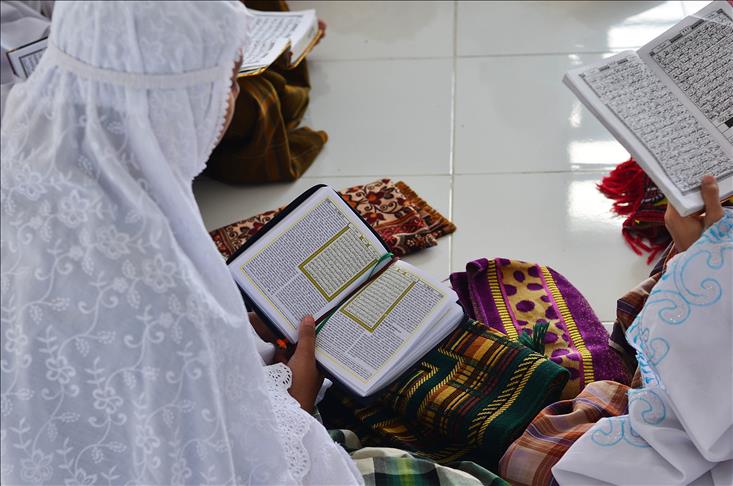
By Ainur Romah
JAKARTA
Muslims in Indonesia started fasting Thursday, celebrating with diverse regional cultural festivities while also recognizing the challenges facing their communities.
In the Aceh region of northern Sumatra island, locals gathered the night before for the tradition of "Meugang" to eat dishes made of chicken and beef before the fasting started.
While Acehnese are excited about Meugang, this Ramadan had extra meaning as North Aceh regency is sheltering Muslim Rohingya migrants from Myanmar.
Since a tri-nation conference on the Southeast Asian boat people crisis May 20, Indonesia, has said it will take the Rohingya in for one year, ascertain which are asylum seekers and which are economic migrants, and then the international community will find homes for them.
Fakhrul Radzi, a volunteer, told Anadolu Agency on Thursday that the Rohingya accommodated at four shelters in the area began fasting after learning of the government's Ramadan announcement.
"Last night they prayed tarawih [a special night-time prayer during Ramadan] together devoutly in the shelter," he said.
A photo he showed Anadolu Agency depicted the migrants - many of whom had arrived in Indonesia on boats with dirty and tattered clothes - now donning spotless garments.
They were draped in “sarung” -- a long of fabric that is sewn at the ends and wrapped around the waist – accompanied by the white skullcaps often worn by Muslims.
Meanwhile in Semarang, a port city in Central Java province, residents organized "Dugderan," or carnivals, and wore traditional clothes as the city’s part-dragon, part-horse mascot – the warak -- was paraded along the streets.
They then gathered at a historic mosque downtown and lit a bamboo cannon to mark the beginning of the fasting month.
Semarang’s mayor told Anadolu Agency that this year’s Dugderan was less festive than the previous, since locals were still grieving the loss of the city's largest marketplace -- a source of livelihood and holiday supplies -- in a fire last month.
"Hopefully, the fasting month will make all of us more patient for any challenge," Hendrar Prihadi said.
Indonesians countrywide all mark the month with the tradition of "nyekar," or visits to the tombs of deceased family members for prayers.
In a once-a-year activity that is rarely missed – even by those living tens of kilometers from their relatives’ burial sites -- people clear the area near the tombs and sow flowers.
"Every year, I always give my time to go home and visit my mother's grave," said Dian, a housewife who traveled for 24-hours from Jakarta to Semarang just to get to her tomb.
Some of those fasting were not able to do so in their own homes, as they are housed in temporary accommodation due to the threat of Mount Sinabung volcano.
In Karo Regency, North Sumatra, dozens of people conducted the first tarawih in tents without any lighting, reported local Metro TV.
Since Sinabung was placed at the highest alert level nearly two weeks ago more than 10,700 residents in six villages have been evacuated to nearby shelters, according to the local administration.
Anadolu Agency website contains only a portion of the news stories offered to subscribers in the AA News Broadcasting System (HAS), and in summarized form. Please contact us for subscription options.







